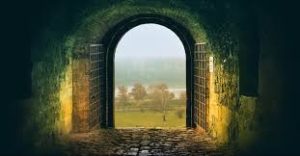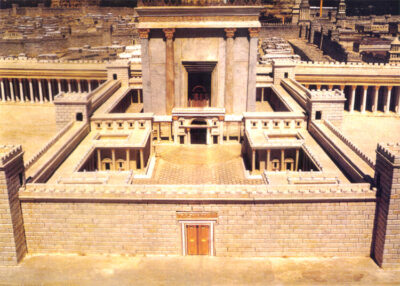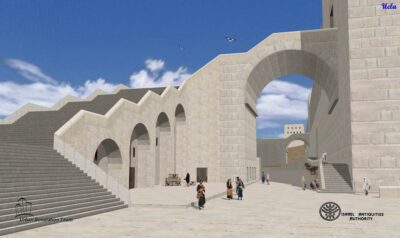The Narrow and Wide Gates
Matthew 7: 13-14
The narrow and wide gates DIG: What is the point of the two gates, two ways, two groups, and two destinations? How might the golden rule in Matthew 7:12 define what Yeshua means by the narrow gate? Why is that way less traveled? Why is it more difficult? How must we enter the narrow gate? What makes the broad way very attractive?
REFLECT: What do you think of when you see the “coexist” bumper-sticker on the car in front of you (with Islam’s crescent moon, the Wiccan pentacle, the star of David, the Chinese yin-yang symbol, and the Christian cross)? What encourages you to stand with the Lord in this current evil world? What entices you to take the wide gate and the broad way? What motivates you to take the narrow gate and way?

In His fourteenth example the Savior of Souls teaches us that true righteousness will never be easy, as portrayed by the narrow way and narrow gate. The Sermon on the Mount contrasts the righteousness of the Pharisees and Torah-teachers with that of the Torah. Here the Messiah tells us that true righteousness chooses the narrow gate, while the false righteousness of pharisaic Judaism chooses the wide gate.
Ultimately, salvation is a choice each of us must make and the Bible presents several examples. Through Moshe, ADONAI confronted the Israelites when He said: I have set before you life and death, blessings and curses. Now choose life, so that you and your children may live (Deut 30:19). Joshua challenged the children of Israel: Choose for yourselves this day whom you will serve, whether the gods your ancestors served beyond the Euphrates, or the gods of the Amorites, in whose land you are living. But as for me and my household, we will serve ADONAI (Josh 24:15). Elijah called for a decision on Mount Carmel: How long will you waver between two opinions? If the LORD is God, follow Him; but if Baal is God, follow him (1 Kings 18:21). God told Jeremiah: Look! I am presenting you with the way of life and the way of death (Jer 21:8).
Here are two gates, narrow and wide; two ways, narrow and broad; two destinations, life and destruction; and two groups, the few and the many. Then Jesus continues in Matthew 7:16-27 to describe two kinds of trees, good and bad; two kinds of fruit, good and bad; two kind of builders, wise and foolish; and two foundations, rock and sand. There is no middle ground. Yeshua demands a decision. We are at the crossroads, and each of us must choose.
Whoever wanted to encounter God in the Temple had to purify themselves ritually, according to the Torah. Among the various methods of purification, the ritual baths played a rather emphatic role for the body, and even the clothes. The ritual baths were a fundamental part of everyday Jewish life (Leviticus 14:8-9; 15:5-27, 16:4, 24, 26, 28, 17:15, 22:6; Numbers 19:7-8, 19, 21; Deuteronomy 23:11; John 13:10; Titus 3:5).
Levitical impurity in its broadest sense was connected to birth and death (Leviticus 12, 15 and 19 for example). It is through this that the two fundamental doctrines can be seen. David said: Surely I was sinful at birth, sinful from the time my mother conceived me (Psalm 51:5). This means that they come into the world with a fallen nature inherited from Adam, which compels them toward evil. And secondly, the wages of sin is death (Romans 6:23). Generally speaking, Levitical impurity taught that sin makes people impure. Jesus made it clear, however, that being ritually impure in itself is not sinful, it is what is inside our hearts and minds that make us impure (to see link click Fs – Why Do Your Disciples Break the Tradition of the Elders?). The possibilities for ritual purification in the Torah use symbolic language to point towards ADONAI’s way of salvation. It led the worshiper from impurity and separation from God, to purity and communion with Him.
At the time of the Second Temple, purification was obtained through washing in a ritual bath of 40 Se’ah (292 liters) of water, completely immersing oneself. There was a rabbinical prescription concerning the building of the ritual baths and the construction of the purification water (Talmud Tractate Miqva’oth). Only by observing those regulations could the water be considered pure. The “doctrine of washings” by means of such ritual baths was uniquely Jewish (Hebrews 6:1-2).
There was a ritual bath and public house of purification near the monumental stairway (called monumental because they had a monumental width of 64m) up to the Beautiful Gate, the main entrance to the Court of the Women.  The steps down into the ritual bath (in an impure state) were wide. After immersion one would make a turn of 180 degrees and (in a pure condition) walk up the steps on the narrow way.
The steps down into the ritual bath (in an impure state) were wide. After immersion one would make a turn of 180 degrees and (in a pure condition) walk up the steps on the narrow way.
Two other ritual baths have been excavated in the Jewish Quarter where the way of impurity and the way of purity were even marked out by separate gate entrances standing next each other. Markings for two entrances have also been found next to the two ways of a ritual bath near the Robinson’s Arch.593 
There have always been two systems of faith in the world. One is built on faith in the LORD, and the other is built on faith in self. One is built on ADONAI’s grace, and the other is built on human works. One is of faith and the other is of flesh. One is of an internal sincere heart and the other is of external hypocrisy. Human religion is made up of thousands of forms and names, but are all built on human achievements and the inspiration of the Enemy of Souls. But, for those who love the God of Abraham, Isaac and Jacob, our faith is built on divine accomplishment and is apart from works (Romans 3:28). Therefore, the choice we make between the two gates and the two ways is a choice for eternity.
Two gates: Enter through the narrow gate. In Yeshua’s Kingdom, the gate to life is not easy, but narrow. But, wide is the gate and broad is the way of the world that leads to destruction, and many enter through it (Mattityahu 7:13 DBT). Everyone enters one gate or the other – that is unavoidable. Here, Jesus pleads for us to enter the righteous gate, God’s gate, the only gate that leads to life and to heaven. The person who enters the narrow gate must enter alone. We can bring no one else and nothing else with us. There is no group rate. Next, God’s gate is so narrow that we must go through it naked. It is the gate of self-denial, through which we cannot carry the baggage of sin and self-will (Matthew 16:24-25). And finally, the narrow gate demands repentance. The rabbis taught that by simply being a Jew, a physical descendant of Abraham, was enough to guarantee a place next to Abraham’s bosom. Many people today believe that church or messianic synagogue membership qualifies them for heaven. But, just because you sit in the garage doesn’t make you a car. Some believe God is too good and kind to send anyone to hell. But, only by turning from our own way and our own righteousness to God’s, is the only way to enter His Kingdom and the only way to keep from perishing.594
Many unbelievers trust in universalism that teaches that everyone goes to heaven. It makes them feel secure in their sin. Satan fools them into believing that there will never be any eternal consequences for rejecting Yeshua. Destruction (Greek: apoleia) does not refer to total extinction or annihilation, but to total ruin and loss (Matthew 3:12, 18:8, 25:41 and 46; Second Thessalonians 1:9; Jude 6-7). It is the destination of hell and everlasting torment because the wicked will be destroyed (Psalm 1:6b NCV).
Two ways: Jesus used things that were familiar to His hearers when He taught. He used the lilies of the field, soils, a gate, a coin, light, bread, birds, a shepherd, and sheep. And so He did here. When He used the examples of the narrow gate – the difficult way (in a pure condition) that leads to life, and the wide gate – the broad way (in an impure state) that leads to destruction, His audience could relate instantly to His teaching. The broad way is the easy, attractive, inclusive, permissive, self-absorbed way of the world. There are few rules, few restrictions, and few requirements. All you need to do is “be religious” and you are accepted. Sin is tolerated, truth is compromised and humility is ignored. The Bible is praised but not studied and Yeshua’s standards are admired but not followed. The wide gate requires no spiritual maturity, no moral character, no commitment and certainly no sacrifice. It is the way that appears to be right, but in the end it leads to death (Proverbs 14:12). The person who says yes to Messiah must say no to the things of this world.
Consequently, there are many people on their way through life, yet only a few on the more difficult way of Christ. But narrow is the gate and difficult the way that leads to life, and only a few find it (Mattityahu 7:14 DBT). The fact that there are few who find ADONAI’s way implies that it is to be sought after with persistence. You will seek Me and find Me when you seek Me with all your heart (Jeremiah 29:13). Nobody ever stumbled into the Kingdom or wandered through the narrow gate by accident. When someone asked Yeshua, “Lord, are only a few people going to be saved?” He said to them: Strive to enter the narrow door, because many, I tell you, will try to enter and will not be able to (Luke 13:23-24). The Greek word for strive (agonizomai) shows that entering the door to God’s Kingdom takes conscious, purposeful, and intense effort. The Kingdom is not for weaklings . . . it is not for Balaam, the rich young ruler, Pilate or Judas. It is not won by means of deferred prayers, unfulfilled promises, and broken resolutions. It is for strong and sturdy men like Moses, Joseph, Elijah, Dani’el, Mordecai, Stephen and Rabbi Sha’ul; valiant women like Sarah, Ruth, Hannah, Deborah, Esther, Anna and Lydia attain it.
Two Groups: Going into the two gates, traveling down two ways, and heading for two different destinations we find two different groups of people. Those who go in through the wide gate travel the way that is broad toward destruction are many. These unbelievers will include atheists, “religious people,” “spiritual people,” humanists, agnostics, Jews and Gentiles – every person from whatever age, background, belief, and circumstance who has not come to saving faith in Yeshua Messiah. From a human perspective, the broad way is the path of least resistance. It’s easy to follow the crowd because people prefer sin to righteousness. John reminds us that people love darkness instead of light because their deeds are evil (Yochanan 3:19). But, all these people will be judged at the great white throne (see my commentary on Revelation Fo – The Great White Throne Judgment).
In contrast to the lost, those who go in through the narrow gate travel the way that is difficult but leads to life, and only a few find it. In Luke 12:32, Jesus looked at His talmidim and said: Do not be afraid, little flock. The word translated little is the Greek word mikros, from which we get our prefix micro, meaning something very small. It is the same word used of the mustard seed, one of the smallest of seeds (see Ew – The Parable of the Mustard Seed). Many are called but few are chosen (Mattityahu 22:14). The number of believers is few not because the gate is too narrow to welcome more. There is no limit to the number who could go through the narrow gate, but, they must go through His gate His way. Nor is the number few because heaven is limited in some way. ADONAI’s grace is infinite, and heaven’s dwellings are without end. The narrow gate is not the easiest way, nor the most popular one. But, it’s the only way that leads to eternal life.595
Two Destinations: Both the wide and narrow gates point to the good life, to salvation, to heaven, to God and His blessing. But, in reality, only the narrow gate leads there. There is no sign on the broad way that reads, “This way to hell,” because the Adversary is a liar and a thief (John 8:44 and10:10). He masquerades as an angel of light (Second Corinthians 11:14). The broad way that starts out so easy gets harder and harder and can lead nowhere but to hell. What initially looks so inviting eventually only leads to destruction. That way is crowded with travelers because it’s attractive and appealing.
But, the LORD’s way, the difficult way, leads to eternal life (see Ms – The Eternal Security of the Believer); eternal fellowship with ADONAI, His angels, and His people. Eternal life is a quality of life, the life of God in our souls. David said: As for me, I will be vindicated and will see Your face; when I awake, I will be satisfied with seeing Your likeness (Psalm 17:15). My Father’s house has many rooms; if that were not so, would I have told you that I AM going to prepare a place for you? I will come back and take you to be with Me that you also may be where I AM. You know the [difficult] way to the place where I AM going (Yochanan 14:2-4). The narrow gate and the difficult way may not look very appealing, but it’s the only way to heaven.596



Leave A Comment